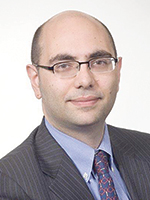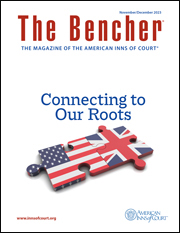Emerging Legal Technology Can Make Clerkships Even Better
The Bencher | November/December 2023
By Raffi Melkonian, Esquire

 Clerkships with federal and state judges are a career highlight for many lawyers. Some even say that their clerkship was the “best job I ever had” even decades later. And there is something undeniably special about working at a judge’s elbow, absorbing the lessons of judicial craft. My experiences clerking for a state court trial judge and a federal court of appeals judge track with that usual story: In those two years, I found mentors who both cared for me and taught me how to practice law. Like many others, I would do those clerkships over again a hundred times.
Clerkships with federal and state judges are a career highlight for many lawyers. Some even say that their clerkship was the “best job I ever had” even decades later. And there is something undeniably special about working at a judge’s elbow, absorbing the lessons of judicial craft. My experiences clerking for a state court trial judge and a federal court of appeals judge track with that usual story: In those two years, I found mentors who both cared for me and taught me how to practice law. Like many others, I would do those clerkships over again a hundred times.
But that positive experience does not hold true for every law clerk. Some graduates report that their judges engaged in serious workplace abuses. In the past few years alone, investigations have revealed hostile work environments, unreasonable expectations, and requirements that law clerks serve as the judge’s personal valet. Even clerks who suffer nothing as extreme as abuse sometimes complain that their judge was a bad fit as a boss or that the clerk was a bad fit as a law clerk.
Any of these unfortunate results can turn a wonderful lifelong memory of apprenticing for a judge into a dark cloud that shadows many years of the lawyer’s career. At the same time, the judge will not have gotten the help he or she needs to do the mission-critical work. Everyone ends up worse off. These problems are made worse because judges, for understandable reasons, are not covered by normal human resources departments. While the federal courts have implemented important reforms that allow clerks and other judicial employees to report wrongful conduct, these are different from the normal workplace protections that cover employees in a law firm.
Legal technology innovators are working on solving this problem. Perhaps the most promising effort I’ve seen is the Legal Accountability Project’s (LAP’s) “centralized clerkships database.” The project was born out of the difficult clerkship experience of founder Aliza Shatzman, Esquire.
LAP collects confidential post-clerkship survey responses from clerks. Former clerks answer a series of questions intended to draw out both positive and negative information about the clerkship. LAP says its process is designed to help clerkship candidates understand whether they might be a good work fit with a particular judge as a manager. The idea, as I understand it, is to allow clerkship applicants to review the database and avoid judges that are abusive but also to target judges that might be a good match for them.
The database might also help candidates consider judges they would not otherwise have found. Certain states may not be on a future clerk’s desired list, but knowing a particularly warm and welcoming judge is looking for applicants there might change the calculus. The database might also help even the playing field among law schools. While the most elite have always had internal databases about judges, schools that only occasionally place law clerks will not. LAP’s centralized database, done properly, might help all those problems.
We need not stop with improving the clerkship experience itself. The other great failure of clerking is the hiring process for federal clerkships (and some state courts). After years of false starts, federal judges have recently instituted a formal clerkship hiring plan. Under the plan, law students cannot be contacted by judges before a certain date and offers must remain open for at least 24 hours.
The plan’s goal was to prevent especially desirable judges from making time-limited offers very early on in a student’s career—some judges were hiring students as early as the first semester of law school. But the clerkship hiring plan continues to have serious problems. Many judges, particularly those not on the East Coast, have chosen not to participate in the plan. Still others work around the plan by hiring recent graduates, leaving students out in the cold when it’s time for them to apply.
Legal technology, theoretically, could help solve this problem as well. Although no one has yet created a system, the medical school’s residency matching program could be a model. Or, perhaps, we may be only a few years from an artificial intelligence model allocating students to judges in accordance with both the judges’ and potential law clerks’ preferences in mind.
Clerking is a distinctive aspect of the U.S. legal system. Technology can help us keep it strong for years to come and for as many students as possible. Just as in our legal practices, we should welcome those changes.
Raffi Melkonian, Esquire, is an appellate partner at the Houston, Texas, law firm of Wright, Close & Barger LLP. He litigates appeals in the state and federal courts of Texas and around the United States. He can be reached at melkonian@wrightclosebarger.com. Melkonian is Master of the Bench member of the Garland R. Walker American Inn of Court.